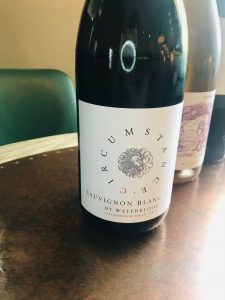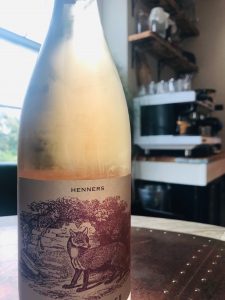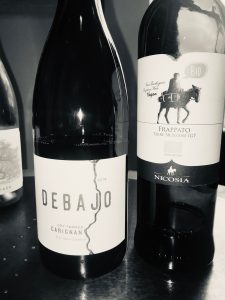Vegan Wine – yes, it really is a thing. #Blog
Victoria Hayes
11th September 2019
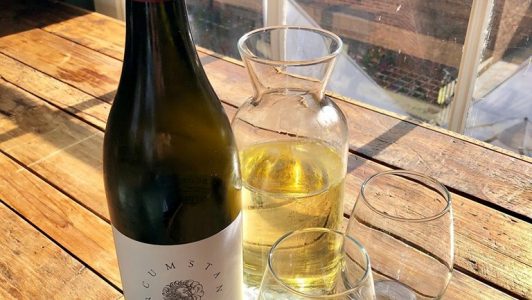
You would be forgiven for imagining that all wine, being made from grapes, would be Vegan. But you would unfortunately be wrong.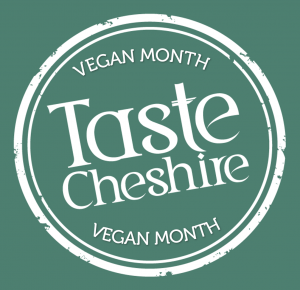
The problem arises in the fining process. We like a bright, clear wine and the natural by products of the fermentation process can leave a wine with a slight haze, some particles in it that don’t seem particularly tempting.
In fact, as a wine ages, these particles settle themselves but young wines in particular are put through fining processes to provide the shiny, clear wine we know and love.
Traditionally however, these processes included a number of animal based products, gelatin (a fairly well known animal product), albumin (egg), casein (milk protein) and isinglass (fish bladder, yes really). They aren’t actually added to the wine, just used in the clarifying process, but nevertheless this would be unacceptable to vegans and many vegetarians.
There is hope for wine drinking vegans though as many wineries have moved to using bentonite (a clay based product) to clear their wines or even activated charcoal to filter out unwanted bits, both of which are vegan and vegetarian friendly. Additionally, there has been a move in the wine industry towards ”natural winemaking methods”, allowing nature to take its course. More and more wine makers are electing not to filter or clarify their wines and leave them to self stabilise.
This does mean however that a Vegan wine, may not be marked Vegan friendly (although some are) – natural wines may only be marked as ‘not fined’ and or ‘not filtered’. I am also reliably informed that the regulations on Vegan wines and their labelling varies greatly from country to country…as so much does in the wine world…and that different regulatory bodies have different requirements to present themselves as a Vegan winery. For example, in America, a winery must be Vegan for a full 12 month probationary period before it may call itself Vegan. Again, you may find yourself drinking a Vegan wine without ever really being aware of it.
I believe research is key in all things, especially in wine, so to learn more about vegan wine, I enlisted the help of fellow wine enthusiast and plant based restaurateur Nicholas (Nic) Friar from Chester’s first entirely plant based restaurant HYPHA.
Nic has been a long time friend of mine and involved in opening some of my favourite places to eat in Chester, The Suburbs, The Chef’s Table and Nine Elephants are some serious highlights to his resume but opening in February of this year, his own Hypha (with business partner Ice Ratta) is something else entirely.
Nic has been plant based for many years but his restaurant isn’t pushing a ” vegan agenda” in fact, if you were to ask Nic why he is plant based, one of his main reasons would be the health benefits; for one thing, it offsets his love of a good alcoholic beverage. In fact, he estimates that 70% of his clientele aren’t actually Vegan, they are there for the food which is, by all accounts phenomenal.
The main watch words for Hypha are
- Seasonality.- Following micro seasonality he creates fine dining small plates which not only look beautiful but which can be tasted as individual elements or brought together in one complex and delicious mouthful.
but almost more importantly,
- Sustainability. – Nic believes in minimal waste (one day he hopes for zero waste) and following that thought he utilises not just one part of each ingredient but each and every bit he can.
For example, he treated me to a taste of his Tepache. Tepache is a Mexican drink made by fermenting the peel and rind of pineapples with brown sugar, cloves, red pepper, chilli flakes and star anise. Nic makes it not only because it is genuinely one of the best drinks I’ve ever tasted, but also because It reduces the waste from using pineapple in one of his dishes. The resulting drink has minimal alcohol content but mixes beautifully with beer to create a delicious light and complex shandy that I could quite happily sup all day…
His other key is offsetting. Yes, there is some impact to the environment importing ingredients and wines, but he always tries to offset these in other ways. He makes all his own soft drinks, kombucha etc from what others might waste in the cooking process. An orange could be used in a salad, its rind pickled and the scraps used to make a vinaigrette.
But back to the wine…
My biggest question when it comes to Vegan wine is how to approach a pairing.
I was taught in a somewhat traditional way, the usual framework being similar to Red with meat, white with fish and so on, but in a plant based world what tools do you use to match your food and wine. At Hypha there is the additional complication of dishes with multiple complex elements, matching those is difficult in of itself, but add to that the risk of clashing with one of the other flavours and it becomes a huge challenge.
Nic’s answer is a combination of elements. The first is to pick really good wines, wines that stand up on their own merits and are just great examples of each type of wine (Vegan of course). The next is to consult with the clientele. ask the customer their likes and dislikes, keep service a consultation and pick a wine to match the person as much as dish. Finally, is to select based on regionality. Most of his dishes have a nod to a particular country’s cuisine, their current “burger” offering has a distinctly Japanese hint with miso mayo, or his potato croquettes with paprika and truffle hollandaise have more of a Spanish heritage, so his wine selections may mirror the more traditional selections for these regions. 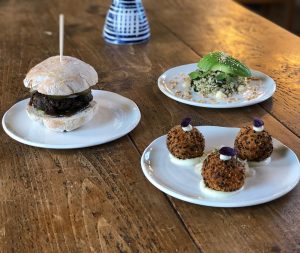
Unable to shake the feeling that this was all just too good to be true, I challenged Nic to prove to me that his wine choices were just as good as he said, delivering on flavour as well as all of these marvellous vegan promises. I should never have doubted.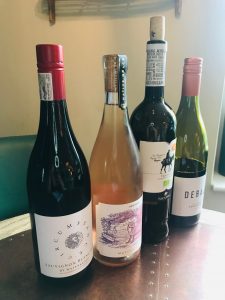
We began with white… South African, Circumstance Waterkloof Sauvignon Blanc, Stellenbosch 2018. This wine is a great example of a 100% natural wine, as mentioned there is no fining process, it’s totally unfiltered so you will get some natural sediment in the bottle, and bottles will vary in colour. However when it comes to taste, this packs a punch of appley cider flavours along with 14.5% abv, this has none of the New Zealand gooseberry, this is all green fruit and richness with a whisper of smokiness running through it.
My only concern with natural wines is a shelf life issue. Most wines can just about manage three days after being opened, a natural wine really only has 12 hours before it becomes undrinkable. That said, this wine is so good I can’t imagine a bottle would need to last that long. But in the retail world, a caution for those selling by the glass, there is a potential here for wastage. (Nic I’m sure has already thought of a way to use it, but for those of us less sustainably minded, this is one to think on).
On to his Rose pick, and Nic presents me with an English wine, with a gleam in his eye, he knows this is a winner before I even taste it. Henners, Nature Grace 2018. Based in West Sussex, Henners are mostly noted for their sparkling wines, but that knowledge and those techniques have carried over into the creation of this Rose. 75% Pinot Meunier and 25% Pinot Noir, both grapes recognisably ones used to make champagne, and hand harvested. This wine is pure strawberries and cream on the palate…young strawberries with a slight but not unpleasant tartness which prevents it being too sweet.
On to Reds and over to Sicily. Nicosia Frappato 2017. Nic lists this wine on his menu as “serve Chilled”. Its a bold move given the general public aversion to serving red wine cold, but he is absolutely right on this one. it’s light, fresh, and full of red fruit, juicy raspberry but with a minerality that would be more usual in a white wine.
Finally he treated me to Debajo Dry Farmed Carignan 2018, and what a way to finish. Made from dry-farmed Carignan grapes grown in Curico’s coastal mountains, these vines have to work really hard to find water and the vines are totally unirrigated. The result is a wine full of rich blackberry and mulberry tones and a crazy long finish which just leaves you desperate for another mouthful.
So What have I learned from my wine trip to Hypha…
That whilst it is only a small part of the wine making process which is officially affected by becoming “Vegan” , the decision to do so can in some cases improve the quality of the wine, as it requires wineries to reconsider all their processes, and in doing so are finding new and possibly better ways to make really good wine.
That’s not to say that all Vegan wines are brilliant, I’m sure they can’t be, but with a guide like Nic Friar at Hypha, you can’t go wrong.
Above this, it makes us, the general consumer think more about how our wine is made and where it comes from and that can be no bad thing. Perhaps, like the advance of the electric car, soon all wines will be Vegan and it will be the normal way of doing things. I look forward to trying all the options as advances are made.
My Thanks to Nic Friar and the team at Hypha for sharing their incredible knowledge and their delicious wines. Hypha is an amazing concept and I recommend anyone give it a try, not just for a glass of really good wine but a dining experience like no other in Chester…Cheshire….go on, I’ll say it, the entire North West. 
5 City Walls , Chester, CH1 2JG
Open Thurs – Sat, 12pm – 2.30pm and 5pm to last sitting at 9.30pm
Sunday 12pm – 3pm and 4.30 – 5.30pm
*Hypha are friends of Taste Cheshire but the views stated here are ours and not paid for by anything other than a couple of glasses of great wine.
Private: H y p h a
5 City Walls, Chester, CH1 2JG

Set on the city’s historic walls, this vegan restaurant has a pleasant rustic feel, thanks to its reclaimed wood décor.
More information